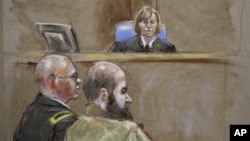HOUSTON —
The jury is now deliberating in the trial of U.S. Army Major Nidal Hasan, accused of murdering 13 people in a shooting spree at Fort Hood, Texas in November 2009. The judge turned the case over to the panel, as it is called in military courts, after the prosecution completed its closing statement. The defendant, who is representing himself, declined to speak.
Isolated in a room in a heavily guarded building at Fort Hood, the panel members are now going over the evidence against Nidal Hasan. There is no evidence to contradict the prosecution case because Hasan, representing himself, offered none in his defense and openly admitted that he had done the shooting.
In order to show premeditation, which is necessary for conviction on the capital murder charge, the prosecution provided evidence that Hasan had purchased the murder weapon and practiced with it well in advance of the attack. They also showed he had been motivated by radical Muslims who preach violent jihad against anyone they consider an enemy of Islam. The presiding judge, Colonel Tara Osborn, imposed some restrictions, but did allow evidence of Hasan's recent exposure to radical Islam through Internet searches.
The compiled evidence showed that this was a well-planned, jihad-motivated attack, according to Jeffrey Addicott, a military law expert at the Center for Terrorism Law at St. Mary's University in San Antonio
"The government did say in their closing argument today that he was motivated by jihad to engage in these murders. There is overwhelming evidence to back up that contention," said Addicott.
A few days ago, the prosecution and Hasan agreed on a definition of jihad that could be given to the jury. It includes the idea of fighting violently against non-believers and a guarantee that anyone killed while carrying out jihad will have a place in paradise.
In order to convict Hasan of the capital murder charge, which carries the death penalty, the jury must make a unanimous decision. A three-fourths agreement is sufficient for other charges.
Jeffrey Addicott says that if the panel convicts Hasan of the capital charge, it will then move on to the trial's punishment phase.
"What happens next is that the defense gets to put forth evidence of extenuation and mitigation; the prosecution gets to put on evidence that he deserves the death penalty," he said. "So that will be a couple of days process. That will take a couple of days process. Now, this case is unique because I believe Hasan will not put on any evidence that he should not die. In fact, quite the contrary, he will tell the jury, 'I want to die.'"
The panel must also make a unanimous decision to impose the death penalty. The votes are marked on paper ballots and kept secret.
The panel hearing the Hasan case consists of 12 officers, plus one officer who serves as a backup member. There are nine colonels, three lieutenant colonels and one major. The panelists came to Fort Hood from other bases around the country so they would not have any direct connection to the people wounded or killed in the shooting.
Isolated in a room in a heavily guarded building at Fort Hood, the panel members are now going over the evidence against Nidal Hasan. There is no evidence to contradict the prosecution case because Hasan, representing himself, offered none in his defense and openly admitted that he had done the shooting.
In order to show premeditation, which is necessary for conviction on the capital murder charge, the prosecution provided evidence that Hasan had purchased the murder weapon and practiced with it well in advance of the attack. They also showed he had been motivated by radical Muslims who preach violent jihad against anyone they consider an enemy of Islam. The presiding judge, Colonel Tara Osborn, imposed some restrictions, but did allow evidence of Hasan's recent exposure to radical Islam through Internet searches.
The compiled evidence showed that this was a well-planned, jihad-motivated attack, according to Jeffrey Addicott, a military law expert at the Center for Terrorism Law at St. Mary's University in San Antonio
"The government did say in their closing argument today that he was motivated by jihad to engage in these murders. There is overwhelming evidence to back up that contention," said Addicott.
A few days ago, the prosecution and Hasan agreed on a definition of jihad that could be given to the jury. It includes the idea of fighting violently against non-believers and a guarantee that anyone killed while carrying out jihad will have a place in paradise.
In order to convict Hasan of the capital murder charge, which carries the death penalty, the jury must make a unanimous decision. A three-fourths agreement is sufficient for other charges.
Jeffrey Addicott says that if the panel convicts Hasan of the capital charge, it will then move on to the trial's punishment phase.
"What happens next is that the defense gets to put forth evidence of extenuation and mitigation; the prosecution gets to put on evidence that he deserves the death penalty," he said. "So that will be a couple of days process. That will take a couple of days process. Now, this case is unique because I believe Hasan will not put on any evidence that he should not die. In fact, quite the contrary, he will tell the jury, 'I want to die.'"
The panel must also make a unanimous decision to impose the death penalty. The votes are marked on paper ballots and kept secret.
The panel hearing the Hasan case consists of 12 officers, plus one officer who serves as a backup member. There are nine colonels, three lieutenant colonels and one major. The panelists came to Fort Hood from other bases around the country so they would not have any direct connection to the people wounded or killed in the shooting.




